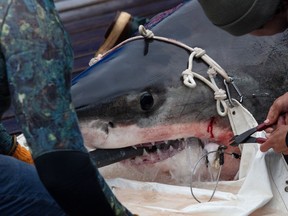Article author:
Canadian news agency
Michael Tutton

HALIFAX — Endangered sharks in Canadian waters New studies on the distribution of sharks suggest that underwater detection networks have stable but not growing populations.
This goes against worrying that the largest predators in the ocean are increasingly wandering around the area. In August of last year, suspicions of an attack on a woman off Cape Breton Island in Nova Scotia and mobile phone videos have raised awareness. In the same month, I'm drawing a shark biting a dead seal.
Shark tracking as the Ocearch group has tagged animals in the region for several seasons, allowing the general public to track creatures online as they travel to the Northwest Atlantic from July to November. The app has also gained popularity.
However, according to a study by a consortium of leading great white shark experts studying animal behavior, sightings in Canada are underwater acoustic networks that pick up signals from tagged animals. Not converted to increased detection by.
A collaborative study published last month in the Canadian Journal of Fisheries and Aquatic Sciences found an increase in the number of tagged sharks and detection systems. Taking into account, the number of Great White Sharks in the Canadian waters seems to be stable.
There is a theory that the number of great white sharks is increasing based on sightings, but it says, "There is limited evidence to support it."
"There was no systematic increase in the proportion of tagged populations visiting Canada's waters, which is the year in which a significant number of animals were tagged (since 2016). During that time, it remained relatively constant, "the study said.
This document was co-authored by Heather Bowlby, Senior Research Fellow, Federal Institute for Atlantic Sharks, Megan Winton, Atlantic White Shark Reserve, North Chatham, Massachusetts, and Gregory Scomal, Massachusetts. Written. Department of Marine Fisheries.
Most sharks were tagged off Cape Cod between 2009 and 2021, and about 3% of sharks were tagged in Canadian waters in 2018 and 2019. It was attached.
{61 According to a survey of migration over the last decade, only about a quarter of the 227 tagged sharks travel to the Atlantic Canada each year.Bowlby said in a recent telephone interview that when scientists explained the increase in surveillance, a "consistent percentage of the total number of tagged (sharks)" appeared in the acoustic network receiving the signal. He said he discovered that he was there.
For example, data show that in the Bay of Fundy in 2016, 70 great white sharks deployed in the area detected three great white sharks, but four years later, three times as many great white sharks. Detected 9 great white sharks. Detected — even if more sharks are tagged. Over the last five years, the study found that 11 to 19 percent of acoustically tagged sharks were detected in Canadian waters.
Bowlby stated that the main purpose of this treatise is to "build a foundation" to explain the important habitat of great white sharks in the region. ..
She generally says that observations of shark behavior (collected from satellite tags that can track shark depth) are the only factor in animal location due to sea temperature and other environmental aspects. He said he was raising important questions about his views. ..
She seems to be doing this behavior regardless of the temperature range of the water, as tags indicate that sharks dive to a depth of about 50 meters in coastal areas during the summer. I said that.
data also showed that most of the sharks that arrive from Cape Cod into the waters of Canada are young and swim long distances to hunt for prey, including seals.
Bowlby has a subtle message about how swimmers and other recreational users in Nova Scotia's waters should react to the presence of sharks.
She said that beach recreational users in the Atlantic region were not at great risk, as the study did not show a "perceptible" increase in shark numbers in Canada. .. However, Bowlby states that "great white sharks are powerful marine predators and sometimes require a little caution."
In an interview on Monday, Paul Deon, director of Nova Scotia Lifeguard Services, said he heard fishermen tell anecdotes when he began his 48-year career in services, even in the late 1970s. He catches great white sharks. He came to believe that it hadn't changed much over the decades.
"I think the risk is very low," he said. "It makes more sense to get injured on a drive to the beach than to be attacked by a shark."
Nevertheless, lifeguard services are at least 2 after witnessing on a patrol beach. Time has a policy on witnessing sharks to clean the water.
This report by Canadian Press was first published on July 4, 2022.

National Post
Thank you for registering.
A welcome email has been sent. If you don't see it, check your junk folder.
The next issue of NPPosted will arrive in your inbox shortly.


